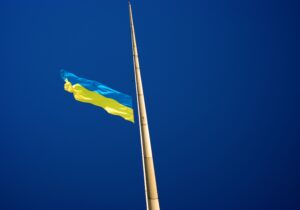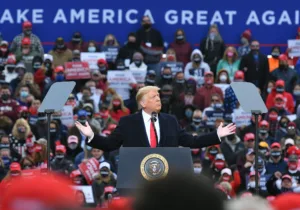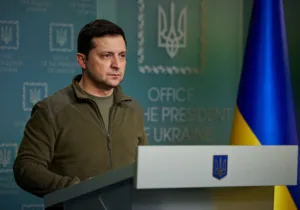The President’s unscripted hope that Putin must go was widely decried as one more disastrous U.S. policy for regime change, although Biden insisted it was not. The topic excites emotions about purported neoconservative crusades in Iraq, Afghanistan and Libya.
Nearly all of America’s wars from the very start have been about regime change. America’s first major war as a young nation in 1812 partly was to seek regime change in Canada. The earlier struggle against the Barbary Pirates at times aspired to regime change. The Mexican War sought regime change south of the border. The Spanish-American War achieved regime change in several of Spain’s remaining colonies. America turned WWI into a war for regime change by crusading for democracy against the German and Austrian autarkies. WWII achieved regime change successfully in Germany, Italy and Japan. Victory in the Cold War fueled regime change in the Soviet Union. U.S. covert aid to Poland’s Solidarity Union and to the Catholic Church helped to lift the Iron Curtain.
Throughout the early 20th century America sought regime change in Latin American nations for self-serving and lofty reasons. America collaborated with Britain in 1953 to achieve regime change in Iran and in 1954 on its own in Guatemala. The Korean War became an unsuccessful attempt at regime change in North Korea. America sought regime change in Cuba after 1959, including assassination attempts, but relented after the Missile Crisis. In 1970 the U.S. unsuccessfully tried to prevent Allende’s accession to power in Chile and was relieved when the Chilean military removed him in 1973. In the Vietnam War the U.S. effectively pushed out a neutralist regime in Cambodia in favor of a pro-U.S. ruler. In the 1980s the U.S. underwrote insurgencies for regime change in Nicaragua, Afghanistan, Angola and Cambodia.
America’s designs for regime change sometimes bring prosperity and liberty. Sometimes they disastrously fail. Often the result is crooked and complex. Allende’s overthrow maybe saved Chile from Sovietization. But Pinochet as dictator killed and tortured thousands. Yet Chile became democratic and successful.
Sometimes America seeks regime change directly through war, sometimes through arming and funding proxies, sometimes through economic pressure, or funding political movements and rhetorical campaigns. America changed regimes in the former Axis powers through global and atomic war. In Iran it was through CIA covert action, such as funding demonstrations. In Nicaragua a rebel army was trained and armed. The seemingly insurmountable task of overturning the Soviet Union entailed hot proxy wars. But more importantly and peacefully it entailed military build-up, economic expansion and technological advances, with which the Soviets could not compete.
At the same time, America pursued regime change against allied rightwing autocracies, persuading Filipino dictator Ferdinand Marcos and Chilean dictator Pinochet to yield to elections. The same was encouraged in South Africa, South Korea, El Salvador, Taiwan, Indonesia, and Brazil. Argentina’s junta was brought down by the Falklands War, where British victory was assured by American help. U.S. and NATO bombs brought down Serbia’s dictator in the Balkans War. Over the years military regimes in Greece and Turkey yielded to American pressure.
So U.S. actions over the last 20 years in Afghanistan, Iraq and Libya are not as extraordinary as sometimes portrayed. Of course, 9-11 prompted the U.S. supported overthrow of the Taliban. The subsequent distress over terrorism and weapons of mass destruction led to overthrowing Saddam Hussein. Libya’s psychotic dictator Muammar Gaddafi had witnessed these events and come to terms with America. But Libyans had too long suffered under his criminality and rebelled. Britain and France, with U.S. backing, intervened to prevent the dictator from mass slaughter, which resulted in Gaddafi’s death. Video of his bloody corpse reportedly had a profound effect on Putin.
Decades of murderous dictatorships in Iraq and Libya had left almost no civil society, leaving chaos in their wake, for which America was blamed. Afghans ultimately did not buy what America offered and have returned to strict Islamist rule. Ostensibly the Iraq War was an unmitigated disaster by unleashing mass disorder, but the current Iraq regime may survive. Libya remains chaotically divided. But it’s hard nostalgically to portray Saddam or Gaddafi as preferable instruments of stability. Over 40 years ago Egypt’s Anwar Sadat had wanted to invade and overthrow Gaddafi, whom he called a madman, but was restrained by the U.S., after which Sadat was assassinated by militants. Maybe Sadat was right.
Waxing nostalgic about old supposedly stabilizing tyrannies is wrong. If the Soviet Union had survived there would be no Ukraine War today. Would we prefer it so? At least Stalin kept the peace! The kind of peace Saddam kept in Iraq killed hundreds of thousands, and his demise, even without U.S. intervention, was always going to be cataclysmic. Blood soaked tyrannies, especially by minority tribes or sects, rarely end well and are usually followed by unleashed rage and vengeance that brewed for decades.
The U.S. obviously is not pursuing regime change in Russia through military or other direct means. But we rightly pray that Putin as orchestrator of war, despotism and mass criminality is replaced, hopefully relatively peacefully. His successor might be worse. Chaos after Putin might be even more dangerous. The future is never certain. But we know that Putin opposes all that decent people hold dear about peace, liberty, and humanity. It would be inhuman not to hope and work for better, which entails risks. Putin’s rule is already proven lethally dangerous for Ukraine, for Russia, and for a world that fears his aggression and his nuclear arsenal.
Preoccupying fears about regime change ignore that regimes are rarely constant and are always churning if not changing. Leaning into Providence often requires not directly challenging dangerous tyrannies but awaiting and quietly encouraging their eventual demise. The outcomes will offer new dangers. But passive acceptance of a deadly status quo and fears about all change are fatalistic, lazy and self-destructive. As Christians, we trust that God in His mercy and care always intends better for tragic, war-torn, sinful and oppressed humanity.
From the very beginning, the U.S., with its founding assertion that God desires life and liberty for all people, has been a spiritual challenge to all tyrants. Even when passive, America is by definition an ongoing argument for regime change wherever the divinely ordained rights of humanity are transgressed.
America cannot orchestrate regime change in Russia. But we must hope for it and entrust Russia’s future to a just Providence whose patience with wicked rulers is not unlimited.







 Sponsor a student for Christianity & National Security 2024
Sponsor a student for Christianity & National Security 2024